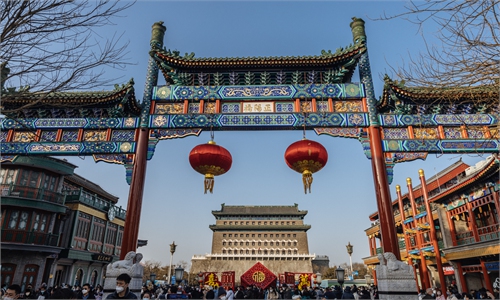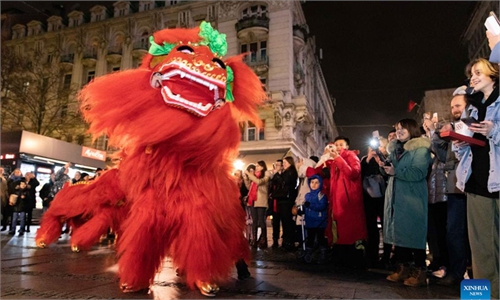Festive buying spree beats expectation, shows Chinese economy's strong resilience
Local firms seize window of opportunity; growth to drive global economic recovery

Beijing's landmark Qianmen Street is packed with tourists on the first day of the Chinese Lunar New Year, which falls on January 22 this year. Photo: Li Hao/GT
China's consumption posted a remarkable rebound during the 2023 Spring Festival, the most important holiday after the country optimized COVID-19 response in December last year, sending out an encouraging signal about the swift recovery of the world's second-largest economy, and that a vibrant Chinese economy will help lift the global economy out of the shadow of the epidemic.
This Spring Festival (from January 21 to Friday), after previous three years' Spring Festival holidays encouraged people to stay put to prevent large-scale virus flare-ups, saw the country's pent-up travel demand greatly unleashed, with legions of tourists again spotted across the country to enjoy the festive holiday.
A total of 308 million domestic trips were made in China during the weeklong holiday, recovering to 88.6 percent of the level seen in pre-epidemic 2019 Spring Festival holiday, according to data from the Ministry of Culture and Tourism released on Friday.
Domestic tourism revenue generated during the holiday totaled 375.8 billion yuan ($55.4 billion), or 73.1 percent of the level during the same period in 2019, statistics from the ministry showed.
Sanya, a city in south China's island province of Hainan, saw groups of tourists flying from across the country to enjoy sunshine as well as duty-free shopping. According to data from the Department of Commerce of Hainan Province, the province's 12 offshore duty-free shops' sales totaled 1.69 billion yuan for the first five days of the festival, up 20.03 percent compared with the first five days of 2022 Spring Festival, while up 325 percent compared with the same period of 2019 Spring Festival, local news outlet Hainan Daily reported.
Apart from tourism and retail, the film market is also getting back on its feet during the seven-day holiday. The box office for the holiday has exceeded 6.734 billion yuan (about $ 1 billion) by Friday, surpassing the box office revenue of 5.8 billion yuan made during 2019 Spring Festival, according to box office tracker Dengta Data.
"The retaliatory consumption shows that consumers' expectations weren't as seriously impacted as some analysts thought, and Chinese people's confidence in the sustainable development of the super-sized economy remains unchanged," Cao Heping, an economist at Peking University, told the Global Times on Friday.
"The remarkable rebound is a real reflection of the strong resilience of the Chinese economy," Cao said, attributing the economic rebound to effective macro-economic policies and a raft of measures to stabilize growth rolled out by the central government.
As one of the three main pillars that drive forward the economy, the consumption sector increasingly serves as a ballast stone for the Chinese economy. Its sound performance marks a good start of the world's second-largest economy and will inject impetus to the global economic recovery.
Propeller for global recovery
During the Spring Festival, Chinese provinces are ramping up efforts to seize the window of opportunity to make a good start for 2023, while keeping the export engine roaring to stabilize the global industrial and supply chains.
Yiwu, China's small commodity hub, will grant an allowance of 100,000 yuan for major industrial enterprises if they continue production during the holiday and their operating income reaches 10 million yuan in the first quarter of 2023.
Zhu Qiucheng, CEO of Ningbo New Oriental Electric Industrial Development, told the Global Times that his company maintains operation during the Spring Festival holiday in order to meet delivery of overseas orders. This came as the company made good harvests by joining a business delegation to Dubai for grabbing orders in December, and is stepping up efforts to meet explosive domestic demand this year.
Meanwhile, the country's logistics sector is maintaining smooth operation to ensure the delivery of cargos at home and cross borders. "Our employees returned to work ahead of schedule on the third day of the Spring Festival holiday to load cargos for shipment to Moscow from Guangzhou, South China's Guangdong Province," said a manager surnamed Yu with a logistic company that engages in cargo transport between China, Belarus and Russia.
"There are too many goods to be delivered before the holiday that our warehouses were almost full," Yu told the Global Times on Friday, noting that Chinese exporters generally produce more goods ahead of the Spring Festival to meet overseas demand.
However, some Western media outlets slander China's economic re-opening, claiming that China's surging demand for raw materials and energy will push up prices of those commodities, adding inflationary pressures for the US and the EU.
Cao blasted foreign media's fear-mongering and slandering, stressing that the Russia-Ukraine conflict prolonged and expanded by the US-led NATO, Western countries' sweeping sanctions against Russia as well as growing unilateralism and protectionism are the causes of the energy crunch in Europe.
"Rather than citing so-called inflation pressure, China's economy rebound drives imports from cars, luxury products to fresh goods, injecting momentum to global economic recovery," he said.
As China's economy continues to gather steam, international organizations and financial institutions project a higher growth rate for China this year, showcasing their optimism about the country's development and investment prospects this year compared to other major economies.
UBS economists led by Wang Tao wrote in a research note sent to the Global Times that they expect the country's consumption sector to greatly rebound starting from the second quarter of 2023. "Ultra volume of deposits Chinese accumulated during the pandemic would be released and the recovery of the services sector would support employment and household income, which will both support continuous recovery of consumer spending," they said, noting that the country's actual consumption may moderately grow by 6.6 percent year-on-year.
In addition, they projected that China's GDP growth may accelerate to 7.2 percent year-on-year in the second quarter, while the whole-year growth may hit 4.9 percent.
The UN World Economic Situation and Prospects 2023 report launched on Wednesday projected that the global output growth will decelerate from an estimated 3.0 percent in 2022 to 1.9 percent in 2023, marking one of the lowest growth rates in recent decades. However, it forecast that China's economic growth will accelerate to 4.8 percent this year, thanks to COVID-19 policy adjustment in late 2022 and the easing of monetary and fiscal policies.




